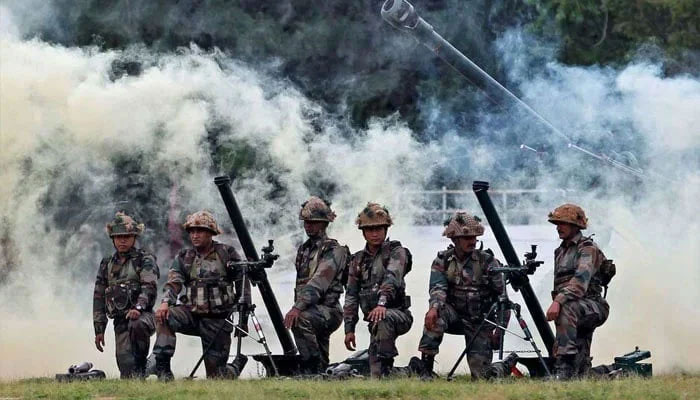The impact of war
LAHORE: War impacts the economies of both countries involved, though the implications differ for the aggressor and the aggressed. In the current conflict, Pakistan’s fragile economy is likely to suffer more, but India’s ambitions of becoming an economic powerhouse would also be severely damaged.
An ongoing war -- depending on its scale and location -- severely disrupts not only the directly involved economies but also the global supply chain. For the country directly in the war zone (invaded or heavily bombarded), industrial production, services, and agriculture decline due to destroyed infrastructure, displacement and labour shortages.
Currency depreciation occurs as investor confidence collapses and rising import bills weaken the local currency. Supply disruptions and hoarding cause prices of food, fuel and essential goods to rise sharply. Investors pull out funds due to heightened uncertainty and political instability. Unemployment and brain drain accelerate as many professionals emigrate or become jobless.
For the aggressor or militarily active country like India, military spending rises sharply. The government is forced to redirect resources from public welfare and productive investments to defence. The country may face trade restrictions, limited access to global finance, and a loss of foreign investment. Aggressive governments often resort to heavy borrowing or printing money, leading to long-term debt and inflation risks. Domestic consumption and investment also decline due to uncertainty and higher interest rates.
The poor suffer the most as resources are diverted and unemployment rises. In India, more than 800 million people dependent on subsidised rations would bear the brunt of the war’s adverse effects. In Pakistan, about 80 million would face similar hardships.
Business leaders in both countries should assess their exposure to affected regions in terms of supply chains, operations, and market demand. They should ensure contingency measures, such as relocating production, diversifying suppliers, and strengthening digital infrastructure. Protecting human resources is vital; employers should prioritise employee safety and enable remote work where possible.
In the medium term, businesses should pivot operations to meet domestic demand for essentials like food, medicines, and energy. If traditional markets are disrupted, alternative export destinations or domestic niches should be identified. Financial resilience must be reinforced by conserving cash, renegotiating terms with creditors, and delaying non-essential capital expenditure.
Some economic activities tend to flourish during wartime. These include defence and arms industries, which see a direct increase in government military spending. Logistics and transportation also experience heightened demand as the movement of troops, equipment, and aid increases. The healthcare and pharmaceutical sectors expand due to a surge in injuries, mental health issues and emergency care needs. Food security becomes critical during war, boosting agricultural activities as imports may be restricted.
Espionage, information warfare and data protection needs rise, requiring cybersecurity personnel to work overtime. For countries like Pakistan and India, which depend on imported energy and fuel, domestic alternatives become strategically important, and prices may skyrocket. In extreme cases, governments might resort to rationing. Post-war, rebuilding damaged areas often triggers a construction boom.
-
 Wiz Khalifa Reveals Unconventional Birthday Punch Tradition With Teenage Son In New Video
Wiz Khalifa Reveals Unconventional Birthday Punch Tradition With Teenage Son In New Video -
 BAFTAs 2026: Kerry Washington Makes Debut In Custom Prada Gown
BAFTAs 2026: Kerry Washington Makes Debut In Custom Prada Gown -
 Jennifer Lopez Gets Emotional As Twins Max And Emme Turn 18
Jennifer Lopez Gets Emotional As Twins Max And Emme Turn 18 -
 Andrew Mountbatten Windsor Blunders Are Result Of 'conspiracy Of Silence'
Andrew Mountbatten Windsor Blunders Are Result Of 'conspiracy Of Silence' -
 Keith Urban Fires Entire Management Team After Divorcing Nicole Kidman
Keith Urban Fires Entire Management Team After Divorcing Nicole Kidman -
 Kylie Jenner Marks Death Anniversary Of Hairstylist Jesus Guerrero With '222' Tribute
Kylie Jenner Marks Death Anniversary Of Hairstylist Jesus Guerrero With '222' Tribute -
 Daniel Radcliffe On How It's Like Seeing New Harry Potter Cast Years Later
Daniel Radcliffe On How It's Like Seeing New Harry Potter Cast Years Later -
 Andrew Portrait Makes Unexpected Debut At Louvre Museum Over Epstein Protest
Andrew Portrait Makes Unexpected Debut At Louvre Museum Over Epstein Protest -
 Italy: Skeleton Of Saint Francis Of Assisi’s Goes On Public Display For First Time After 800 Years
Italy: Skeleton Of Saint Francis Of Assisi’s Goes On Public Display For First Time After 800 Years -
 Hailey Bieber's Subtle Gesture For Eric Dane’s Family Revealed
Hailey Bieber's Subtle Gesture For Eric Dane’s Family Revealed -
 Moment Prince William 'broke Down' And 'apologised' To Kate Middleton
Moment Prince William 'broke Down' And 'apologised' To Kate Middleton -
 Paul Mescal And Gracie Abrams Stun Fans, Making Their Romance Public At 2026 BAFTA
Paul Mescal And Gracie Abrams Stun Fans, Making Their Romance Public At 2026 BAFTA -
 EU Rejects Any Rise In US Tariffs After Court Ruling, Says ‘a Deal Is A Deal’
EU Rejects Any Rise In US Tariffs After Court Ruling, Says ‘a Deal Is A Deal’ -
 King Charles Congratulates Team GB Over Winter Olympics Success
King Charles Congratulates Team GB Over Winter Olympics Success -
 Meryl Streep Comeback In 'Mamma Mia 3' On The Cards? Studio Head Shares Promising Update
Meryl Streep Comeback In 'Mamma Mia 3' On The Cards? Studio Head Shares Promising Update -
 Woman Allegedly Used ChatGPT To Plan Murders Of Two Men, Police Say
Woman Allegedly Used ChatGPT To Plan Murders Of Two Men, Police Say




